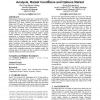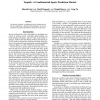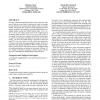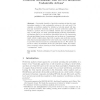45 search results - page 3 / 9 » Zero-intelligence agents in prediction markets |
ARGMAS
2008
Springer
13 years 7 months ago
2008
Springer
Abstract. The purpose of this paper is to investigate how argumentation processes among a group of agents may affect the outcome of group judgments. In particular we will focus on ...
GECCO
2007
Springer
13 years 11 months ago
2007
Springer
Schulenburg [15] first proposed the idea to model different trader types by supplying different input information sets to a group of homogenous LCS agent. Gershoff [12] investigat...
AAAI
2008
13 years 7 months ago
2008
We describe Yoopick, a combinatorial sports prediction market that implements a flexible betting language, and in turn facilitates fine-grained probabilistic estimation of outcome...
ATAL
2009
Springer
14 years 1 days ago
2009
Springer
We study combinatorial prediction markets where agents bet on the sum of values at any tree node in a hierarchy of events, for example the sum of page views among all the children...
WINE
2009
Springer
14 years 1 days ago
2009
Springer
A potential downside of prediction markets is that they may incentivize agents to take undesirable actions in the real world. For example, a prediction market for whether a terrori...




